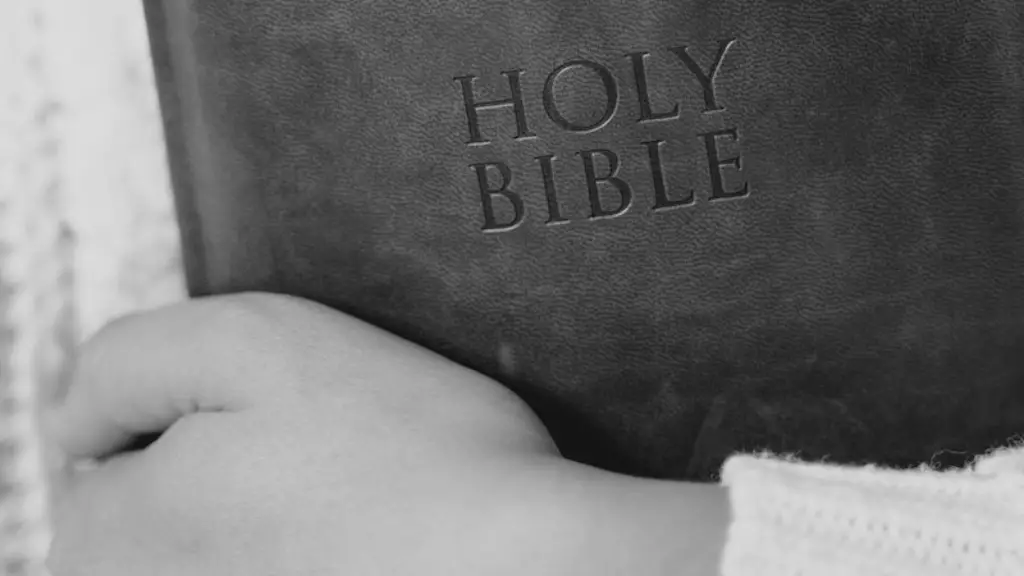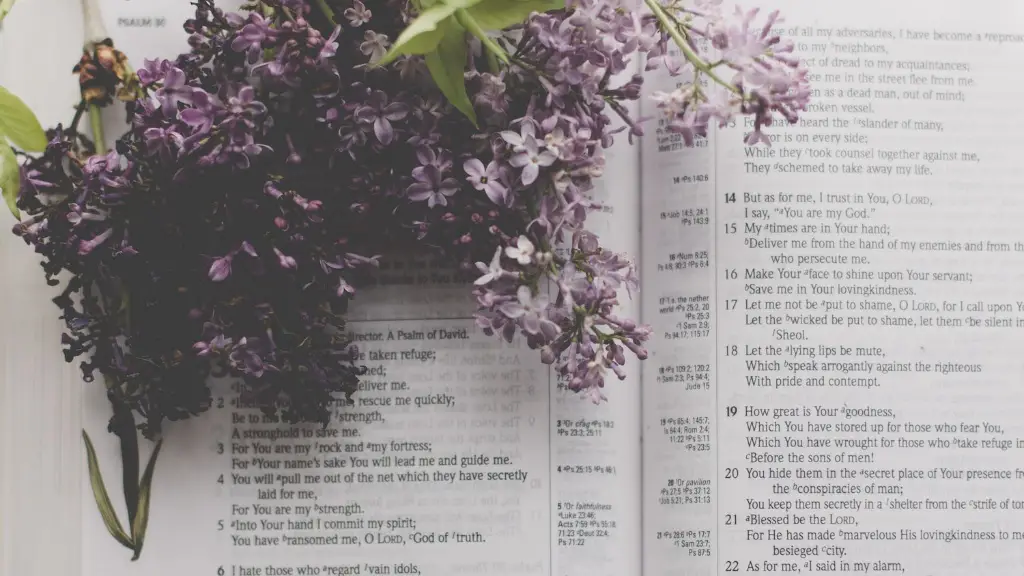The Bible can be a confusing and daunting book, especially if you’ve never read it before. Where should you start? What part of the Bible should you read first?
Here are a few suggestions:
1. Start with the Gospels. The Gospels – Matthew, Mark, Luke, and John – tell the story of Jesus’ life, death, and resurrection. They are a great place to start if you want to learn about who Jesus is and what he did for us.
2. Another option is to start with the book of Genesis. Genesis is the first book of the Bible, and it tells the story of creation, the fall of man, and the beginning of God’s plan of redemption.
3. If you’re looking for a specific topic, you can try a concordance or a Bible dictionary. These resources can help you find where to find verses on topics that interest you.
4. Finally, don’t be afraid to ask someone else for help. Talk to your pastor or a mature Christian friend, and they can help you figure out where to start reading the Bible.
The Bible is a large book, and it can be daunting to try to figure out where to start. A good place to start reading is in the New Testament, specifically the Gospels of Matthew, Mark, Luke, and John. These books tell the story of Jesus Christ and his teachings. Another good place to start reading is in the book of Acts, which tells the story of the early church.
How should a beginner read the Bible?
The Bible is a huge book and can be overwhelming if you try to read it all at once. A better approach is to start with small portions, reading a long passage or one chapter a day. Spend about 10-15 minutes reading and savor each word and phrase. You can gradually work up to reading an entire book in one sitting, but don’t try to do too much too soon.
There is no one right way to read the Bible. However, the gospel approach is a good way to read the Bible. This means that we read every passage as somehow contributing to the single, overarching storyline of Scripture, which culminates in Jesus. This approach helps us to see how all of Scripture points to Jesus and his redemption of the world.
Is it best to read the Bible in Chronological order
There is no question that studying the Bible chronologically can help us to better understand God’s character. After all, the Bible is His Word, and it tells us the story of His dealings with His people throughout history. By studying the Bible chronologically, we can see how He has always been faithful to His promises, even when His people have not been. We can also see how His character has been revealed through His Son, Jesus Christ. In short, studying the Bible chronologically can help us to better understand who God is and how He has dealt with His people throughout history.
1. Pray for a hunger for God’s Word.
2. Set a definite time to read the Bible every day.
3. Read consecutively, so that you don’t miss anything.
4. Turn your heart to the Lord as you read, and pray over what you read.
5. Keep track of your Bible reading, so that you can see your progress.
6. Guard against distractions, so that you can focus on what you’re reading.
Should I read Old or New Testament first?
There are a few reasons for this. The first is that the New Testament contains the story of Jesus Christ, who is the central figure of Christianity. Reading the New Testament first gives readers a better understanding of who Jesus is and what he did.
The second reason is that the New Testament is a fulfillment of the Old Testament. Many of the stories and events in the Old Testament are referenced and explained in the New Testament. Reading the New Testament first can help readers understand the Old Testament better.
Lastly, the New Testament is generally easier to read and understand than the Old Testament. The Old Testament can be dense and confusing, especially for people new to Christianity. Reading the New Testament first can help ease people into Christianity and help them understand the faith better.
To make the process of memorizing the order of the books in the Bible more interesting, try the following:
-Read as much as you can about each book in the Bible, and memorize facts about them.
-Write summaries of each book, and your thoughts about them.
-Discuss often with others what you’re reading and learning.
-Listen to lectures about each book in order.
How many times a week should I read the Bible?
The Bible is essential to a Christian’s daily life. It is a source of truth, guidance, and comfort. Unfortunately, there is a concerted effort to keep followers of Christ from reading the Bible regularly. This is having a detrimental effect on people’s personal lives. Those who engage the Bible one to three days a week show basically the same effect on their personal lives as those who do not engage at all. It is essential that Christians make time to read the Bible every day.
The Bible is not just a book of historical events or a moral code to live by. It is living and active, and through it, God speaks to us. When we read the Bible, we are encountering the living God. And as we read, we come to know God better and to understand his character and his will for our lives.
Reading the Bible regularly and consistently has several benefits. First, the Bible shows us God’s character and provides us God’s revelation of himself to his people. In each section of the Bible, we see God’s holy, unchanging, faithful, gracious and loving character. As we read, we learn more about who God is and how he wants us to live.
Second, the Bible is a source of wisdom and guidance for our lives. It can help us to know what is right and wrong, and to make godly choices in our lives. As we read and study the Bible, God speaks to us through it, giving us wisdom and guidance for the decisions we face.
Third, the Bible is a source of strength and comfort. As we read, we can see how God has often intervened in history to help his people, and we can take comfort in knowing that he is still at
What is the 3030 challenge
The 3030 Challenge is a great way to get into the habit of studying the Word every day. It only takes 30 minutes a day for 30 days, and you will see a difference in your life.
The Bible is our primary source for understanding who Jesus is and what He did. The Gospels give us an account of His life and teachings here on earth. They are central to our faith because they show us that Jesus is God Himself. He came to earth as a human being to show us the way to live. His example is the perfect standard for how we should live our lives.
Do Christians follow the New Testament or old?
Christians who believe they are under the law of Christ follow all the laws found in the New Testament. This includes the laws about love, marriage, sexuality, honesty, and respect. These Christians may also avoid any law that would require them to sin, such as the law against murder.
The New Testament focuses more on the life and teachings of Jesus and the Christian church. The Old Testament explains the history of the creation of the world, the exodus of Israelites, and the Ten Commandments given to Moses by God. The New Testament is the second major division of the Christian Bible. It contains 27 books, which are divided into four sections: the Gospels, the Acts of the Apostles, the Letters, and the Revelation. The Gospels tell the story of Jesus’ birth, life, death, and resurrection. The Acts of the Apostles, also known as the Book of Acts, tells the story of the early church. The Letters are collection of letters written by various authors, such as Paul, to various churches. The Revelation is a book of prophecy written by John the Apostle.
What is the simplest Bible to understand
The Easy-to-Read Version (ERV) is a translation of the Bible that was written for people who find reading hard. It uses easy words and short sentences. It is one of the easiest Bibles to read and understand.
The Holy Bible: Easy-to-Read Version (ERV) is an English translation of the Bible compiled by the World Bible Translation Center. It was originally published as the English Version for the Deaf (EVD) by BakerBooks. The ERV is a great resource for people who want to read the Bible in an easy-to-understand format.
What is the simplest way to study the Bible?
1. Read through the chapter carefully
2. Seek to find its main subject or subjects
3. Give each chapter a title that suggests its main content
4. Reread the chapter and make a simple outline
5. Take note of any practical or theological problems in this chapter
6. Study the chapter inductively
7. Apply the truths of the chapter to your life
Despite the fact that only a third of Americans who attend a Protestant church read the Bible every day, the majority still read it at least once a week. This indicates that the Bible is still an important part of many Americans’ lives, even if they don’t read it as often as they would like.
Warp Up
The Bible is a large and complex book, so there is no easy answer to this question. However, many people recommend starting with the New Testament, specifically the Gospels of Matthew, Mark, Luke, and John. These books tell the story of Jesus Christ, and provide a foundation for the rest of the Bible. Once you have a good understanding of the Gospels, you can move on to the rest of the New Testament, and then the Old Testament.
Here are a few suggestions for starting points in the Bible:
-If you want to know more about God and his character, start with the book of Genesis. It tells the story of God creating the world and everything in it, and it sets the stage for the rest of the Bible.
-If you want to know more about Jesus, a good place to start is the book of John. It is one of the four gospels, and it gives a detailed account of Jesus’ life, ministry, and teachings.
-If you want to understand what the Bible has to say about a specific topic, like love, forgiveness, or hope, start by reading through the book of Proverbs. It is full of wisdom from God that can be applied to our lives today.
-If you want to get an overview of the Bible, start with the book of Psalms. It is a collection of 150 songs and poems that praise God, and it provides a great overview of the different themes and topics in the Bible.





